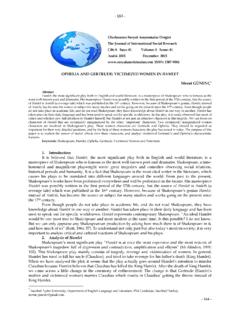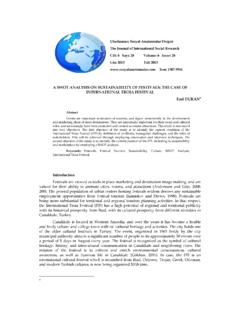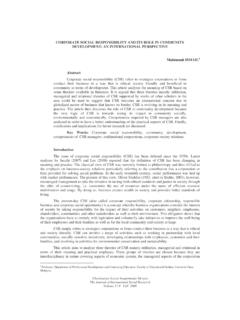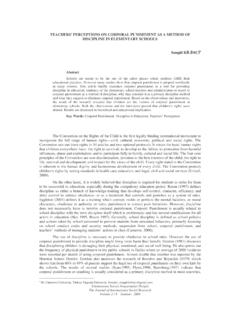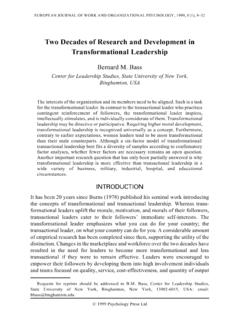Transcription of Comparing Transformational Leadership in …
1 Uluslararas Sosyal Ara t rmalar Dergisi The Journal of International Social Research Volume 2/6 Winter 2009 Comparing Transformational Leadership in successful and Unsuccessful Companies Assoc. Prof. Dr. Gholamreza Jandaghi* Assoc. Prof. Dr. Hassan Zareei Matin** Ali Farjami** Abstract In this article, while it is attempted to describe the problem and its importance, Transformational Leadership is studied by considering Leadership theories. Issues such as the definition of Transformational Leadership and its aspects are compared on the basis of the ideas of various connoisseurs and then it ( Transformational Leadership ) is examined in successful and less successful companies.
2 According to the methodology, the method of research, assumptions, community and statistical sample are investigated and research findings are analyzed by using descriptive and deductive statistical methods in the framework of analytical tables. Finally, our conclusion is provided by considering the results of statistical tests. The final result shows that there is more Transformational Leadership in successful companies than unsuccessful ones. Keywords: Transformational Leadership , idealized influence, inspirational motivation, intellectual stimulation, individualized considerations.
3 _____ * General Management, Organizational Transformation ** University of Tehran, Qom Campus ** University of Tehran, Qom Campus Uluslararas Sosyal Ara t rmalar Dergisi The Journal of International Social Research Volume 2/6 Winter 2009 357 Introduction: Leadership is an issue drawn by researchers since old times. Because of their unique traits, leaders influence the organization and society overall. In the organizations, Transformational leaders could be a competitive advantage to increase the efficacy and performance of such organizations.
4 These organizations have to pose some changes in order to adopt themselves with environment. These changes could be occurred in areas such as human resources, aims, strategies, structures, etc. sometimes, the need to radical and fundamental changes is felt in the organizations. In such cases, Transformational Leadership is required to make radical changes. It should be noted that radical changes are not only prescribe to treat internal problems but also this approach could be applicable for successful organizations in order to achieve higher performance and using present and future environmental chances is effective and inspirational.
5 Problem definition: The effective role of managers and leaders in radical changes and transformations is unavoidable in the organizations. Leadership and management are not identical. To influence over others, management is depended on formal power while Leadership is resulted from a social influence process. Leaders make cultures and their fundamental role is affecting others. In other words, Transformational leaders try to make changes that increase organizational efficacy and performance. These are changes that cause higher aim and expectations to the organization.
6 One of the results of Transformational leaders is organizational performance improvement. Transformational leader provides a ground for long-term organizational changes which facilitate the access of organizational system to higher objectives. Regarding the necessity of making fundamental changes in the organizations and the effective role of organizational Leadership and management in such changes, it is necessary to do some researches in this field.
7 Owing to the fact that Transformational Leadership is, inter alia, a new applied theory in organizational behavior and has achieved to valuable results in those organizations that have utilized it so far, in this research, the researcher tries to explain the situation of Transformational Leadership in successful and less successful organizations. It is noteworthy that the radical model in this research is Bernard Boss's Transformational Leadership model. Transformational Leadership The initial concept of Transformational Leadership was provided by Burns in his researches about political leaders.
8 According to Burns, Transformational Leadership is a process in which leaders and followers promote each other to higher levels of morality and motivation. Transformational leaders help their followers to look at old problems via a new perspective. They stimulate their followers to attempt higher than usual levels. Transformational leaders inspire their followers to think more than their own aims and interests and to focus on greater team, organizational, national and global objectives.
9 By providing future perspective, such leaders influence over their followers in a manner that they assume that perspective as their own aim and show high efforts to achieve it. These leaders are able to move the organization toward the ideal perspective by coordinating the employees and integrating all system components (Cacioppe, 2000, p. 336). Transformational leaders are referred to those ones who try to show the organizations a new route for improvement and progress by generating new ideas and perspectives.
10 They also mobilize the organization by motivating managers, employees and members of the organizations to radical changes, transforming organizational pillars to achieve necessary readiness and capabilities to move in this new route as well as achieving higher levels of idealized performance (Sanjaghi, 2000, p. 44). Transformational leaders increase their followers' creativity, motivation and spirituality while transactional leaders address to personal and future interests of their followers.
